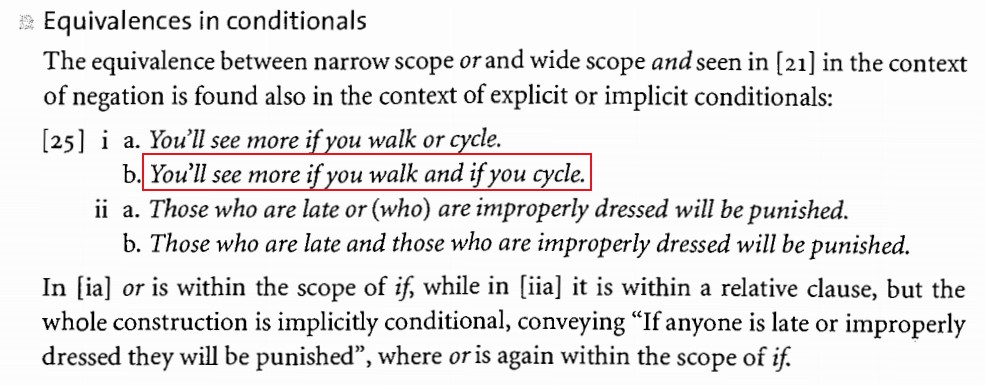2 分析:You’ll see more if you walk and if you cycle.
这句话出自《剑桥英语语法》(The Cambridge Grammar of the English Language)P1299:

请问这个句子合逻辑吗?这个 and 用得对吗?(一个人不可能既走路又骑车吧)
最佳答案 2021-06-01 08:31
这应该算是个初中的语法知识点。
它那段话也没说啥重要的东西,就说了这么个事儿:它就是在讲or和and在句子中可以相互转化,也就是所谓的“对等”(equivalence),当然它在这里说的是在条件句中的对等和转化。那里面还提到了一个“seen in [21] in the context of negation”,也就是在上一个章节中应该是讲到了在具有否定含义的句子中or和and的对等转化。
比如,You will see more if you walk or cycle. 这是个由if引导的条件句,or这个词位于if引导的条件句中(within the scope of “if”),这里面的连词or连接了两个动词(narrow scope"or"),这个句子可以转化为:You will see more if you walk and if you cycle. 把or连接的那两个动词扩展成了两个句子,然后用and把两个条件句连接了起来(wide scope"and")。但这两个句子表达的意思是一样的,它们是对等的。if you walk or cycle=if you walk and if you cycle,意思都是:你可以步行也可以骑车。体会一下:这是个“二选一”的概念,不是个“同时”的概念。
然后又给出了一个例句:Those who are late or (who) are improperly dressed will be punished. 同样,这个句子也可以转化为:Those who are late and those who are improperly dressed will be punished. 这两句话表达的意思也是一样的,也是对等的。上一个例句中有个“if”,所以是个“显性条件句”(explicit conditional),而这个例句中没有出现“if”,但是它表达的意思隐含着条件句,所以是个“隐性条件句”(implicit conditional),根据它表达的句意可以把它改写成:If anyone is late or improperly dressed, they will be punished. 改写之后的句子就和第一个例句的形式一样了,“or”这个词就又回到if条件句中去了。("or" is again in the scope of "if")
- 4 关注
- 0 收藏,2605 浏览
- 刘智 提出于 2021-05-26 23:12
相似问题
- 连词 and 的有无问题 2 回答
- 剑桥英语语法屈折词形标准 1 回答
- 请教曹老师现在完成时用法 2 回答
- since和ever since之间的区别 1 回答
- 请教曹老师剑桥英语语法现在时的用法 1 回答
- 请教曹老师关于剑桥英语语法动词的问题 1 回答
-
 《高考英语备考1号·速效编》
《高考英语备考1号·速效编》
-
 《高考英语备考1号·写作编》
《高考英语备考1号·写作编》
-
 《高中英语晨读晚记》
《高中英语晨读晚记》
-
 《高中英语错题笔记》
《高中英语错题笔记》
-
 《零起点考大学英语》
《零起点考大学英语》
-

